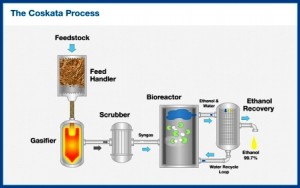
It's said that using biomass, cheap farm waste, could radically alter the economics of ethanol. The lower cost could end taxpayer subsidies, though the farm lobby holds powerful sway in the "pay to play" Washington scene.
Brazil’s 10 millionth flex-fuel vehicle was built last week, ready to be fueled by sugarcane- derived ethanol from an industry that is not government subsidized.
In the U.S. taxpayers are subsidizing inefficient corn-derived ethanol to the tune of almost $4 billion annually ($0.45/gallon federal production subsidy, plus state and local incentives), and the farm lobby and agribusiness are pushing for more taxpayer feed to be put into the trough by way of increasing the amount of ethanol beyond the 10% that is legally required to be blended into fuel.
That might be OK, except that ethanol is roughly 33% less fuel efficient than gasoline; so it’s another cost increase in the middle of the Great Recession. And at current prices the higher blend of U.S. made ethanol, E85, which could really help limit oil imports from terrorist supporting regimes, is not competitive with gasoline.
Worse, protective tariffs effectively stop the importation of ethanol that makes economic sense, but not political sense in pay-for-play Washington. (Click Here)
The production subsidy for ethanol applies to both domestic and imported ethanol, but the United States charges importers of ethanol a tariff of 54 cents per gallon and an ad valorem tariff of 2.5% of the value of the imported ethanol. This means countries such as Brazil that can produce ethanol much more efficiently than the U.S. are effectively blocked from selling it here. This protectionist policy also applies to other global markets.
The Brazilian Sugarcane Industry Association (UNICA) represents the top producers of sugar and ethanol in the country’s South-Central region, especially the state of Sao Paulo, which accounts for about 50% of the country’s sugarcane harvest and 60% of total ethanol production.
In 2008, Brazil produced an estimated 565 million metric tons of sugarcane, which yielded 31.3 million tons of sugar and 25.7 billion liters (6.8 billion gallons) of ethanol, making it the number-one sugarcane grower and sugar producer in the world, and the second-largest ethanol producer on the planet, behind the United States.
“We congratulate the auto industry in Brazil for its vision and the boldness shown when it chose to invest heavily in Flex technology, to the point that many of these industries do not even produce vehicles powered exclusively by gasoline any more,” said the president the UNICA, Marcos Jank.
“The next step is to take this technically proven and highly successful project to the rest of the world, since all major automakers in Brazil have a global presence. Despite its indisputable success in Brazil, Flex-Fuel technology is not widely offered in other parts of the world, largely because of the lack of commitment to produce, use and distribute ethanol. Where there is in fact interest and ethanol production and use, there are barriers, especially tariffs, preventing the entry of the imported product,” Jank said.
UNICA sees that situation as ironic: while fossil fuels move freely around the world, renewable fuels, capable of positively impacting climate change, are blocked, at a time when politicians repeatedly and gravely express their concern for global warming.
“We know this is not a simple or quick process, but the introduction of Flex-Fuel vehicles around the world is something that has to be considered, and it can only happen with decisive support from automakers. Without it, Brazil would not have accomplished such positive results and it will not be different in other countries. The role of the auto industry is crucial,” said Jank.
A contentious rulemaking process at EPA
Right now, a rule making process is EPA on how it should calculate the life-cycle effects of renewable fuels on air pollution. (Click Here)
From an automotive point of view, there are two central issues:
- The first is how to decrease emissions and our dependence on imports of foreign oil from terrorist supporting countries.
- The second is a subset of the first: what if the biofuels we are using – ethanol, biodiesel, natural gas — really cause more emissions than they save? That is why how the EPA calculates the life cycle emissions effects is of such concern to subsidized businesses, the agricultural lobby and various clean air special interest groups.
The U.S. is already under Congressional mandate to use increasing amounts of renewable fuels. Under the Energy Independence and Security Act of 2007, EPA is responsible for revising and implementing regulations to ensure that gasoline sold in the United States contains a minimum volume of renewable fuels.
The Renewable Fuel Standard program will increase the volume of renewable fuel required to be blended into gasoline from 9 billion gallons in 2008 to 36 billion gallons by 2022. (At one point the goal under President Bush was 35 billion/2017.)
The new renewable fuel program regulations are being developed with what the EPA euphemistically says is a “collaboration with refiners, renewable fuel producers, and many other stakeholders.”
Translation: Big bucks are at stake here, and lobbying is intense.
